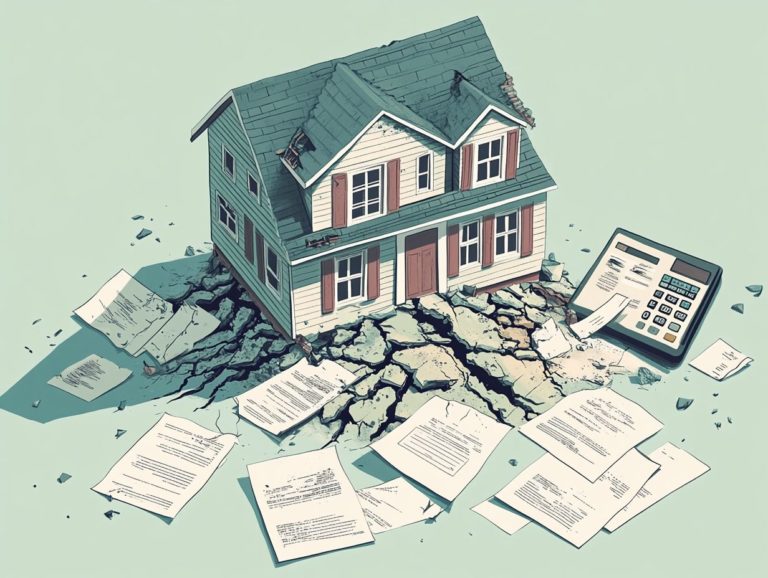Can You Get Home Insurance with Bad Credit?
Navigating the realm of home insurance can feel overwhelming, especially when you have bad credit. Many individuals remain unaware that their credit history significantly affects insurance rates, leading to confusion and anxiety.
This article will clarify how credit affects home insurance, explore options for those with poor credit, and provide valuable tips for boosting your credit score.
Whether you’re seeking affordable coverage or aiming to improve your financial health, this information will be your guiding light.
Contents
- Key Takeaways:
- Understanding Credit and Home Insurance
- Options for Getting Home Insurance with Bad Credit
- Improving Your Credit for Better Insurance Rates
- Tips for Finding Affordable Home Insurance with Bad Credit
- Frequently Asked Questions
- Can You Get Home Insurance with Bad Credit?
- What Credit Score is Considered Bad for Home Insurance?
- How Does Bad Credit Affect Home Insurance Rates?
- How Can I Improve My Chances of Getting Home Insurance with Bad Credit?
- Are There Alternatives to Traditional Home Insurance with Bad Credit?
- How Can I Keep Home Insurance Affordable with Bad Credit?
Key Takeaways:

Your credit score can influence your home insurance rates, so it’s crucial to understand this relationship.
If you have bad credit, there are many alternative options for getting home insurance, such as companies that do not rely on credit scores.
Boosting your credit score can unlock fantastic insurance rates, so take proactive steps to improve your credit before searching for insurance.
Understanding Credit and Home Insurance
Understanding how credit affects home insurance is crucial for homeowners, particularly those with lower credit scores. Insurance companies often use credit scores to assess risk, which can profoundly impact your insurance rates.
In states like California and Maryland, the role of credit history in determining homeowners insurance premiums has become increasingly important. With the rise of comparison shopping and credit-based insurance scores, it s vital for policyholders to recognize how their credit situation shapes their insurance products and coverage options.
How Credit Affects Insurance Rates
Credit scores play a critical role in determining your insurance rates. Many homeowners insurance companies utilize credit-based insurance scores to evaluate risk and set premiums. These scores reflect your creditworthiness, impacting both your eligibility for coverage and the rates you receive.
If your credit score is above 700, you’re likely to enjoy considerably lower premiums, as these scores indicate reliability and lower risk of default. On the other hand, if your score falls in the 580-669 range, you may encounter significantly higher premiums or even denial of coverage.
This disparity underscores the importance of maintaining a strong credit history. When combined with a clean claims record, it can greatly enhance your options in the insurance market. This knowledge is essential for homeowners seeking to protect their properties while keeping costs manageable.
Options for Getting Home Insurance with Bad Credit
Homeowners with bad credit may find it challenging to secure affordable homeowners insurance.
However, there are many options available to help you navigate these hurdles and obtain adequate coverage.
Non-Credit Based Insurance Companies

Non-credit-based insurance companies offer valuable alternatives for homeowners struggling with bad credit. They provide coverage options that do not rely heavily on credit scores during the underwriting process.
These insurers take a more holistic approach, considering factors like claims history, property location, and the overall risk profile of the applicant rather than solely depending on credit metrics.
For instance, companies like Assurance and Amica assess an applicant s claims history and the condition of their property to determine premium rates, creating a fairer landscape for those facing penalties from traditional insurers.
By focusing on these diverse elements, non-credit-based insurers can often tailor policies that better meet the unique needs of individual homeowners.
Take control of your insurance journey today! Check your credit score and consult with insurance professionals for personalized advice.
Alternative Insurance Options
As a homeowner with poor credit, you might want to explore various alternative insurance options that emphasize flexibility and affordability in coverage.
One compelling choice is the FAIR (Fair Access to Insurance Requirements) plan, crafted specifically for those whose homes are considered high-risk. A high-risk home is one that is more likely to experience damage due to various factors like location or age. These plans generally provide essential protection without the rigorous requirements often imposed by traditional insurers.
Specialized insurers focus on high-risk properties, ensuring that you can access coverage tailored to your unique needs.
Collaborating with knowledgeable insurance agents is beneficial. Their expertise in navigating these specialized options helps you secure the most appropriate policies at competitive rates, considering your credit history and the condition of your property.
Improving Your Credit for Better Insurance Rates
Take charge of your credit improvement; it s essential for securing more favorable homeowners insurance rates. Insurers frequently assess credit scores when determining risk and calculating premium costs.
Improving your credit can significantly impact your insurance experience and financial savings.
Steps to Take for Credit Improvement
To enhance your credit score, concentrate on effective debt management and maintain a low credit utilization ratio. Both can significantly elevate your financial ratings.
In addition to these strategies, establish a realistic budget that aligns with your income and expenses. Track your spending habits to identify areas for potential cutbacks, freeing up more funds for debt repayment.
Sticking to a schedule of timely bill payments not only helps you dodge late fees but also showcases your financial responsibility to credit bureaus.
Regularly monitoring your credit report enables you to spot discrepancies and identify areas ripe for improvement. A robust credit profile often unlocks better insurance rates, underscoring the importance of credit management as a cornerstone of your overall financial health.
Tips for Finding Affordable Home Insurance with Bad Credit

Finding affordable home insurance with bad credit might feel like an uphill battle, but with a strategic approach to comparison shopping and the expertise of insurance agents, you can uncover better rates and coverage options.
By leveraging these resources, homeowners can navigate the market effectively and secure the protection they need without breaking the bank.
Comparison Shopping
Comparison shopping for homeowners insurance is essential for securing affordable coverage, particularly if you have bad credit. It enables you to evaluate various insurance rates and policies, guiding you toward the best options available.
Gather multiple quotes to gain valuable insights into which policies align with your needs while also offering competitive pricing. Understanding the nuances of each policy such as deductibles, coverage limits, and exclusions is crucial for making informed decisions.
Look beyond just the premium costs; assessing the quality of customer service and claims handling of the insurance providers is equally vital.
This comprehensive approach ensures that your home is adequately protected and can yield significant savings over time, demonstrating that informed choices truly pay off in the long run.
Negotiating with Insurance Companies
Negotiating with insurance companies can be a game-changer for securing better homeowners insurance rates. Many insurers are open to offering discounts or customizing insurance products to align with your specific needs.
Enter negotiations armed with a clear understanding of your claims filing history. This knowledge strengthens your bargaining power, showcasing your history of responsible homeownership.
Don t hesitate to ask about available discounts whether it s bundling your home and auto policies or loyalty discounts for being a long-term customer; these inquiries can lead to significant savings.
Additionally, be prepared to shop around and compare quotes from multiple providers, enabling you to advocate effectively for favorable terms and lower premiums in your discussions.
Frequently Asked Questions
Can You Get Home Insurance with Bad Credit?

Yes, you can get home insurance with bad credit. It might be harder, and your premiums may be higher.
What Credit Score is Considered Bad for Home Insurance?
What counts as bad credit can vary by insurance company. Generally, a score below 600 is deemed bad credit.
How Does Bad Credit Affect Home Insurance Rates?
Insurance companies often use your credit score to set rates. A lower score might lead to higher premiums.
How Can I Improve My Chances of Getting Home Insurance with Bad Credit?
You can take steps to boost your chances. Compare quotes, work on improving your credit score, and look for available discounts.
Are There Alternatives to Traditional Home Insurance with Bad Credit?
Yes, some companies provide high-risk insurance policies for those with bad credit. Expect higher premiums and limited coverage options.
How Can I Keep Home Insurance Affordable with Bad Credit?
To keep your home insurance costs down, regularly check and improve your credit score. Also, compare quotes and enhance your home s security to reduce the risk of claims.





